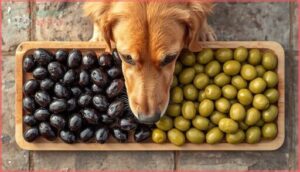This site is supported by our readers. We may earn a commission, at no cost to you, if you purchase through links.
Your dog spots an olive rolling off your plate and snatches it before you can react—now you’re wondering if that’s a problem. Most pet owners are surprised to learn that black olives aren’t toxic to dogs, but “not toxic” doesn’t automatically mean “safe to share freely.”
The real concern hides in the details: sodium levels that can spike well beyond what a dog’s kidneys handle comfortably, pits that become choking hazards, and seasonings that cross from harmless to dangerous fast. Whether your dog grabbed one by accident or you’re considering it as a treat, knowing exactly what’s in that little olive changes everything.
Table Of Contents
- Key Takeaways
- Can Dogs Eat Black Olives?
- Nutritional Value of Black Olives for Dogs
- Health Benefits of Black Olives for Dogs
- Potential Risks of Feeding Black Olives
- How Black Olives Compare to Green Olives
- Safe Ways to Prepare Black Olives for Dogs
- Dangerous Black Olive Ingredients to Avoid
- Signs of Olive Poisoning in Dogs
- Can Puppies or Senior Dogs Eat Black Olives?
- Healthier Alternatives to Black Olives for Dogs
- Frequently Asked Questions (FAQs)
- What are signs of olive poisoning in dogs?
- Are black olive trees toxic to dogs?
- Can dogs eat pitted black olives?
- Which olive is healthier, black or green?
- Is black olive beneficial for dogs?
- Can dogs eat green olives?
- Can dogs eat olives from a tree?
- Can dogs eat salted olives?
- Are black olives safe for dogs to eat?
- Can dogs have green olives with pimento?
- Conclusion
Key Takeaways
- Plain, pit-free black olives are not toxic to dogs, but their high sodium content (up to 735mg per 100g) makes them a rare treat rather than a regular snack.
- The biggest risks are not the olive itself — it’s the olive pits, briny salt, and stuffed seasonings like garlic or onion that can cause real harm.
- Puppies and senior dogs with kidney or heart conditions should skip olives entirely, since their bodies handle excess sodium much worse than healthy adults.
- If your dog needs a safe snack, carrots, blueberries, or cucumber slices deliver better nutrition without the sodium baggage.
Can Dogs Eat Black Olives?
Your dog just snagged a black olive off your plate, and now you’re wondering if it’s time to panic.
Good news — one black olive probably won’t hurt, but if you’re worried about sneaky table food in general, this guide on dogs and human foods like grits breaks down what’s actually risky and what isn’t.
The good news is that black olives aren’t toxic to dogs, but that doesn’t mean they’re a free-for-all snack.
Here’s what you need to know before sharing another one.
Are Black Olives Safe for Dogs?
Plain black olives aren’t toxic to dogs, so a nibble here and there won’t send you rushing to the vet. That said, canine nutrition doesn’t really benefit from them.
From a pet safety standpoint, the real concerns are sodium and fat — both run high in most commercial varieties. For dogs with existing canine health issues like kidney or heart disease, food toxicity risk rises fast.
Healthy dogs? Usually fine in small amounts. To better understand guidelines for feeding olives, consult trusted veterinary sources for recommendations.
Recommended Serving Size
So how much is actually okay? Serving guidelines depend on your dog’s size — and sticking to portion control matters more than you’d think.
- Small dogs (under 20 lbs): 1 olive, once weekly
- Medium dogs (20–50 lbs): 2 olives, twice weekly max
- Large dogs (50+ lbs): 3 olives, spaced a week apart
- Always rinse first — it cuts sodium roughly in half
Calorie limits and feeding frequency keep black olives a safe, occasional addition to your dog’s diet rather than a canine nutrition concern. Remember to avoid olive pits and choking hazards when offering olives to dogs.
Nutritional Value of Black Olives for Dogs
Before deciding whether black olives belong in your dog’s bowl, it helps to know what’s actually inside them. They do contain some nutrients, but the full picture is a little more complicated.
Here’s a closer look at what black olives bring to the table — and what you’ll want to watch out for.
Vitamins and Minerals in Black Olives
Black olives bring a quiet mix of vitamins and minerals to the table. They contain vitamin E, which helps protect your dog’s cells from damage, plus vitamin A to support healthy eyesight and skin.
You’ll also find iron, calcium, and trace minerals like copper that support bones and energy. Think of them as a small nutritional bonus — not a dietary supplement, but not nothing either.
Fat and Sodium Content
That small nutritional bonus comes with a catch, though. Fat and sodium levels in black olives are genuinely worth watching.
About 77 percent of their calories come from fat, and a 100-gram portion packs roughly 735 milligrams of sodium — nearly a full day’s worth for a medium dog. For calorie management and nutrient balance in your dog’s diet, keeping portions tiny and infrequent is the smarter move.
Black olives pack nearly a full day’s worth of sodium into a single 100-gram serving — keep portions tiny
Health Benefits of Black Olives for Dogs
Black olives aren’t exactly a superfood for dogs, but they do carry a couple of genuine upsides worth knowing about.
They’re a far cry from risky foods like grits, which can be tricky for dogs depending on preparation.
The benefits are modest, so don’t expect miracles — but they’re real.
Here’s what black olives actually bring to the table for your dog.
Antioxidant Properties
Here’s something worth knowing: black olives carry a surprisingly potent antioxidant punch. They contain natural polyphenols — like hydroxytyrosol — that fight free radicals and reduce oxidative stress at the cellular level.
These polyphenol benefits support dog health by protecting cells and tissues from everyday metabolic wear. For dog nutrition and health, that cellular protection matters. Hydroxytyrosol’s antioxidant effects are even stronger than vitamin C, making it a standout compound in olive nutrition.
Healthy Fats and Skin Health
The fats in black olives — mostly monounsaturated oleic acid, the same fat found in olive oil — quietly do a lot of work for coat health. They support your dog’s skin barrier, helping it hold moisture and resist dryness.
Think of it as internal conditioning for their fur. Combined with modest omega supplements in the diet, these fatty acid benefits can mean a softer, glossier coat over time. Just keep portions tiny.
Potential Risks of Feeding Black Olives
Black olives aren’t toxic, but they do come with a few real risks worth knowing.
Most problems trace back to just a handful of things. Here’s what to watch out for before sharing any with your dog.
High Sodium and Salt Toxicity
Canned black olives pack around 735 mg of sodium intake per 100 grams — easily matching your dog’s entire daily sodium allowance in one sitting.
That kind of sodium intake throws off electrolyte balance fast. When sodium spikes in the blood, hypernatremia sets in, pulling water from cells and stressing the brain and kidneys.
Dehydration risks climb quickly, and serious salt toxicosis can follow.
Gastrointestinal Upset
Even one too many black olives can send your dog’s stomach into chaos. The high fat content is a real trigger for vomiting and diarrhea, especially in dogs prone to pancreatitis risk.
Swallowed pits raise intestinal blockage concerns that may need surgery. Marinated olives with garlic or spices cross into toxic territory, causing serious gastrointestinal issues far beyond simple stomach irritation.
Weight Gain and Obesity Risks
Black olives might seem like a harmless snack, but the calories quietly stack up. About 77% of an olive’s calories come from fat, and for a small dog needing only 200–275 calories daily, even a handful pushes past healthy limits.
- Extra fat drives Fat Accumulation fast
- Sodium Impact causes water retention and bloating
- Uncounted Calorie Intake disrupts Diet Management
- Obesity Prevention starts with tracking every treat
- Long-term overfeeding shortens your dog’s life
How Black Olives Compare to Green Olives
Black and green olives might seem interchangeable, but there are a few key differences worth knowing before you share either with your dog.
From sodium levels to how they’re usually prepared, the details matter.
Here’s how the two stack up.
Nutritional Differences
Both olives look similar, but the nutrition tips here are worth knowing. Green olives run about 167 calories per 100 grams, while black olives pack around 299. That’s nearly double the calorie density.
Black olives also carry more fat, which shifts the macronutrient balance in your dog’s diet faster than you’d expect. Vitamin profiles and mineral comparison between the two are broadly similar — the real difference is fat and fiber content.
Safety Considerations
Both types share the same core safety concerns regarding dog health. Neither is toxic in plain form, but olive toxicity risk rises fast with pits, seasonings, or high-sodium brine.
Green olives tend to be slightly lower in fat, making them a marginally lighter option — but pet safety rules stay the same. Watch for digestive issues, remove pits to eliminate choking hazards, and always check for food allergies or added ingredients.
Safe Ways to Prepare Black Olives for Dogs
If you do decide to share a black olive with your dog, how you prep it matters more than you’d think.
A few simple steps can make the difference between a harmless snack and an unnecessary trip to the vet.
Here’s what to keep in mind before you hand one over.
Removing Pits and Choking Hazards
Before you toss your dog an olive, the pit has to go — no exceptions. Olive pits are a real choking hazard, especially for small breeds, and swallowing one can cause a digestive blockage that may need surgery.
For solid pit removal tips, cut each olive lengthwise and check for pit fragment dangers by squeezing the center. Follow these olive safety measures and dog feeding guidelines, and you’ll keep snack time safe.
Avoiding Seasonings and Stuffed Olives
Plain is the only way to go. Even a little garlic or onion — common in stuffed and marinated olives — can damage your dog’s red blood cells, leading to serious anemia. That’s not a risk worth taking.
For safe preparation methods, stick to these rules:
- Skip stuffed olives with garlic, onion, or blue cheese fillings
- Avoid anything marinated in spicy oils or seasonings
- Never offer olives soaked in brine without rinsing first
- Choose plain, pitted olives only — nothing added
Dangerous Black Olive Ingredients to Avoid
Plain black olives are one thing, but the ingredients that often come with them are a different story.
Some common additions can seriously harm your dog, even in small amounts. Here’s what to watch out for.
Garlic, Onion, and Spicy Fillings
Stuffed olives are one of the sneakiest sources of food toxicity in a dog’s diet. Garlic and onions — both classic olive allergens — belong to the allium family and trigger allium poisoning by damaging red blood cells, potentially causing anemia.
Spicy reactions from capsaicin fillings add another layer of risk, causing vomiting and digestive distress. Even marinated olives can carry garlic toxicity through the brine alone. Always check labels before sharing.
Excessive Salt and Preservatives
Brine risks often fly under the radar, but they’re real. A hundred grams of canned black olives can pack around 735 milligrams of sodium — nearly a medium dog’s entire daily dietary limit.
That kind of salt intake adds up fast, especially when your dog’s regular kibble already meets their needs. Preservative effects from additives like potassium sorbate are usually mild, but hidden sodium-based preservatives can quietly push your dog toward sodium toxicity.
Signs of Olive Poisoning in Dogs
Even when dogs eat just a few too many black olives, their bodies can react quickly. Knowing what to watch for can make a real difference in how fast you get them help.
Here are the key signs to keep on your radar.
Symptoms to Watch For
Your dog’s body speaks up fast when something’s wrong. After eating too many black olives, toxic reactions can kick in within hours.
Watch for these early signals:
- Vomiting or diarrhea lasting more than a few hours
- Abdominal pain, shown by whining, hunching, or restlessness
- Salt overload signs like excessive thirst, confusion, or muscle tremors
Digestive issues and emergency signs involving dog health and food safety deserve your full attention.
When to Contact a Veterinarian
Sometimes knowing when to call your vet makes all the difference. Here’s a quick guide to help you decide how urgently your dog needs vet care after eating black olives.
| Situation | Urgency | Action |
|---|---|---|
| Toxic Exposure (garlic, xylitol, alcohol) | Emergency Care | Call vet immediately |
| Salt Poisoning (tremors, confusion) | Urgent Symptoms | Same-day vet consultation |
| Vomiting or diarrhea over 24 hours | Monitor closely | Prompt vet care |
Can Puppies or Senior Dogs Eat Black Olives?
Age changes everything in terms of what your dog can safely eat. Puppies and senior dogs both need extra care regarding dog diet decisions — and black olives aren’t a great fit for either life stage.
For puppies, Puppy Nutrition is still developing, and their digestive systems are more sensitive. Even small amounts of high-sodium foods can disrupt canine health early on.
Senior dogs face their own challenges:
- Kidney and heart conditions make excess sodium especially risky
- A slower metabolism increases weight gain risk
- Digestive sensitivity makes gastrointestinal upset more likely
An Olive Allergy, while rare, can show up at any age. And unlike olive oil — which has some studied benefits — whole black olives or green olives offer little upside for Pet Safety at these vulnerable life stages. When in doubt, ask your vet first.
Healthier Alternatives to Black Olives for Dogs
Black olives aren’t the best snack for your dog, but that doesn’t mean treat time has to be boring.
Plenty of everyday foods are safer, more nutritious, and just as satisfying for most dogs. Here are some solid alternatives worth keeping on hand.
Safe Fruits and Vegetables for Dogs
If you’re skipping olives, there’s no shortage of better options for your pup. Think of fresh produce as nature’s multivitamin — blueberries pack vitamins A, C, and E, while carrot sticks offer fiber-rich, low-calorie crunch that’s great for dental health.
For dog nutrition and pet health, plain watermelon, cucumber slices, and green beans make safe foods for dogs that support a balanced dog diet without the sodium risk.
Vet-Recommended Dog Treat Options
In the context of dog treats and snacks, the bar isn’t hard to clear — you just need to know what to look for. Veterinary advice consistently points to these vet-recommended picks:
- Natural treats with real chicken or fish as the first ingredient
- Dental care chews with a veterinary acceptance seal
- Limited ingredients, grain-free options for sensitive stomachs
- Healthy chews with glucosamine for joint support
- Nutrient supplements like omega-3-enriched treats for coat health
Frequently Asked Questions (FAQs)
What are signs of olive poisoning in dogs?
Signs of olive toxicity include vomiting, diarrhea, and lethargy. Salt poisoning from brined olives can trigger seizures. If your dog shows these canine symptoms, emergency care is essential.
Are black olive trees toxic to dogs?
Black olive trees (Olea europaea) aren’t toxic to dogs. The ASPCA doesn’t list them as poisonous plants.
Still, eating too many fallen olives can upset your dog’s stomach, so rake up dropped fruit regularly.
Can dogs eat pitted black olives?
Yes, pitted black olives are safe for dogs in small amounts.
Removing the pit eliminates choking and dental risks, making olive preparation a simple but important step for responsible dog care and canine health.
Which olive is healthier, black or green?
Both olives look similar, yet their nutritional profiles tell different stories.
Green olives edge ahead in polyphenol levels and fat content, but their higher sodium comparison tips the scales — making plain black olives the smarter occasional diet choice.
Is black olive beneficial for dogs?
Not exactly. While olives offer trace antioxidants and healthy fats supporting canine health, the benefits are minimal.
For true pet wellness and dietary balance, safer options like carrots deliver better dog nutrition without excess sodium.
Can dogs eat green olives?
Green olives aren’t toxic, but they’re not a great snack either. The salt alone can upset dog digestion. Stick to plain, pitted pieces — and only once in a while.
Can dogs eat olives from a tree?
Fresh olives from a fruiting tree aren’t toxic to dogs, but tree olive safety depends on one key factor: the olive pit.
Olive pit risks include choking hazards and intestinal blockage, so always supervise your dog around fruiting trees.
Can dogs eat salted olives?
Technically, salted olives won’t kill your dog on the spot — but they’re far from a safe snack.
Extra sodium strains canine health, and salt toxicosis is a real risk worth avoiding entirely.
Are black olives safe for dogs to eat?
Plain, pitted black olives aren’t toxic to dogs, but that doesn’t make them a free-for-all snack. For most healthy dogs, one or two pieces occasionally is generally fine.
Can dogs have green olives with pimento?
A single pimento-stuffed green olive won’t hurt a healthy dog, but the salty brine is the real concern.
Too much sodium stresses their kidneys fast. Stick to one, rinsed, and pit-free.
Conclusion
Olives contain up to 735 mg of sodium per 100g—far more than a dog should handle in a day. That single number tells the whole story.
Can dogs eat black olives? Yes, occasionally and carefully. One plain, pit-free olive won’t hurt a healthy adult dog, but the risks stack up fast with the wrong preparation. Treat it like a rare exception, not a routine snack, and your dog stays both happy and safe.
- https://www.rover.com/blog/can-my-dog-eat-olives/
- https://www.poochandmutt.co.uk/blogs/can-dogs-eat/olives
- https://nativepet.com/blogs/health/can-dogs-eat-olives
- https://www.thedogbakery.com/blogs/news/have-you-ever-wondered-if-dogs-can-eat-olives
- https://www.dogster.com/dog-nutrition/can-dogs-eat-olives

















